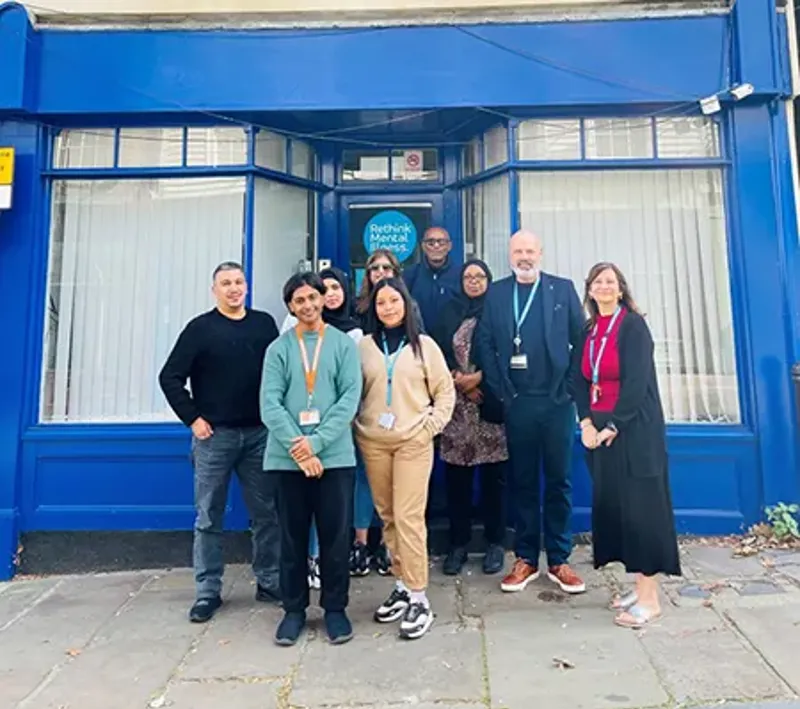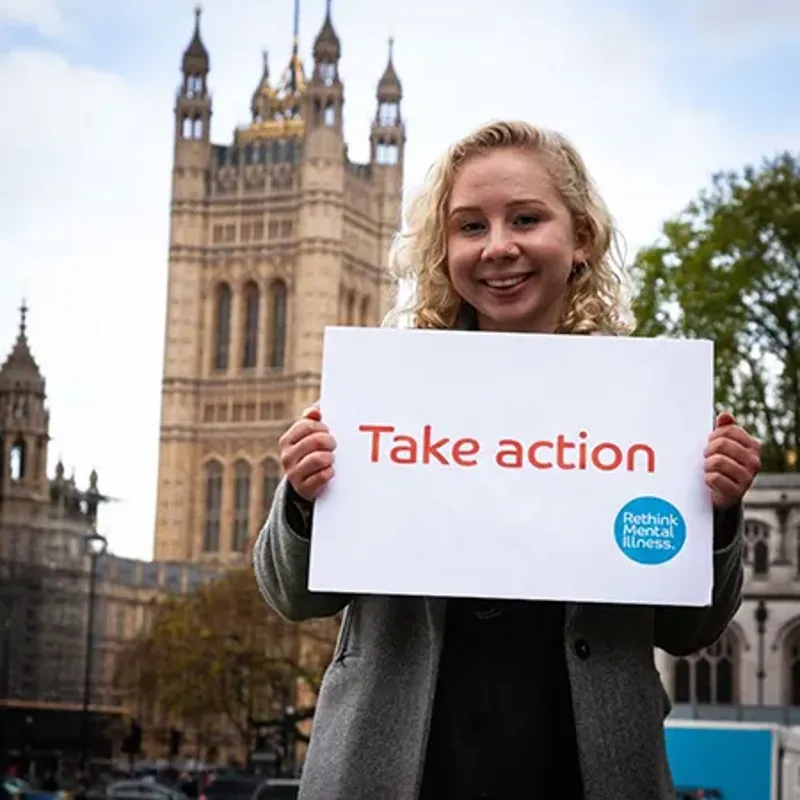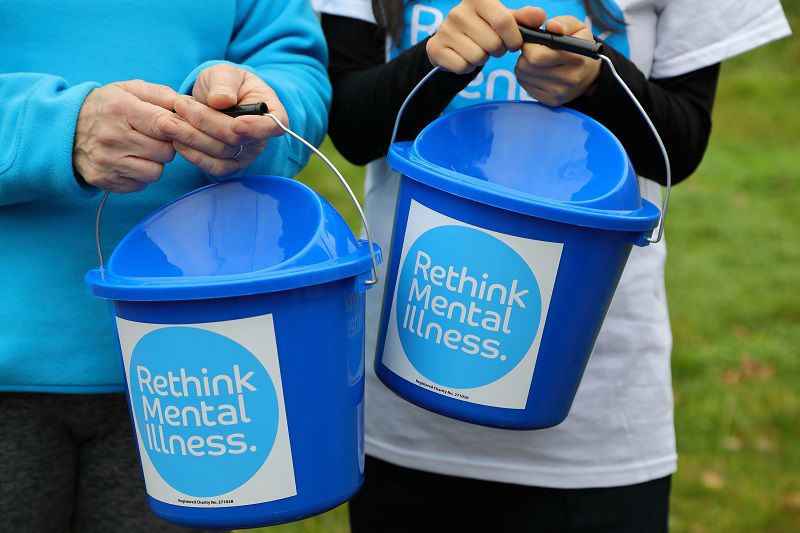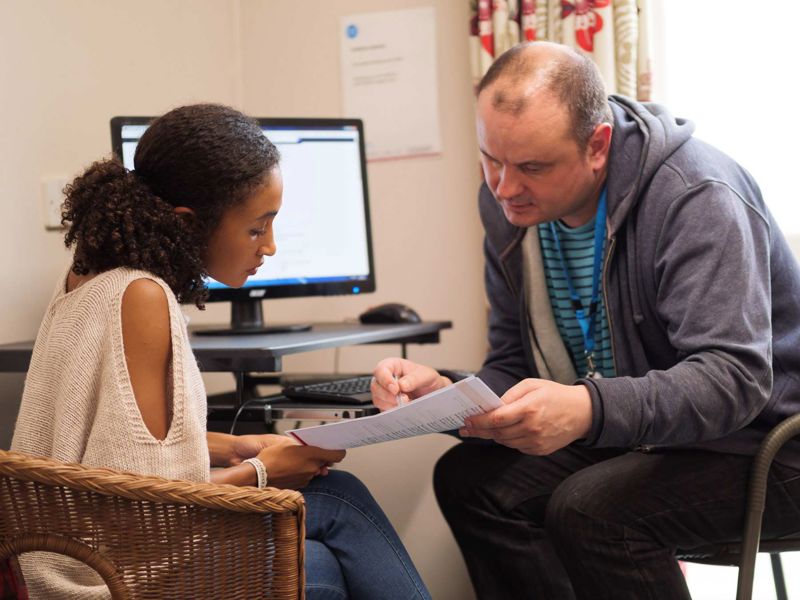Most popular
Recommended
Our vision and impact
DEBUG | Category: | CategoryRank: -1 | Importance: 0How we are measuring our mission to improve the lives of people severely affected by mental illness. … »Read more on Our vision and impact
Campaign with us
DEBUG | Category: | CategoryRank: -1 | Importance: 0Rethink Mental Illness campaigns nationally and locally to improve the quality of life for everyone severely affected by mental illness by pushing mental health up the public agend… »Read more on Campaign with us
Fundraise for us
DEBUG | Category: | CategoryRank: -1 | Importance: 0Sign up today and take in the scenic sights of the capital! … »Read more on Fundraise for us
Work with us
DEBUG | Category: | CategoryRank: -1 | Importance: 0At Rethink Mental Illness, we’re more than a charity — we’re a movement for change. Every day, we provide trusted information, life-changing services, and supportive communities fo… »Read more on Work with us
Long COVID and mental health
This section gives information on long COVID and mental health. It explains the symptoms, treatments, and ways to manage the condition. This information is for adults in England who live with long COVID. It is also for their loved ones and carers and anyone interested in the topic.
We are a trusted information creator and accredited by the Patient Information Forum (PIF). See this 46 second video for why this is important.
Do you have accessibility tools for this information?
- There is an accessibility function on this webpage called Recite.
- On the desktop site, click on the icon in the top right-hand corner next to ‘Donate.’
- On the mobile site, scroll right and click on the ‘Turn on accessibility’ icon.
- You can watch a short video about Recite here.
Overview
- Long COVID is an illness you can develop after getting COVID. It can affect your physical and mental health.
- The symptoms of COVID are usually mild and pass quickly. But if they last weeks or months this is known as long COVID.
- Your GP can refer you to appropriate services. They can give you tests, treat your symptoms, and give support for your mental and physical health.
- You can help manage your symptoms by looking after your physical wellbeing. And getting help for your mental health if you need it.
- You might be a carer with long COVID, or support someone with long COVID. You can get support from carer’s services.
Need more advice?
What is long COVID and what are the symptoms?
What is COVID-19?
COVID-19 is an infectious respiratory illness. A respiratory illness is one that affects your lungs and airways.
Most people with COVID will have mild to moderate symptoms. They will recover without needing special treatment. But some people will become more ill and need specialist medical attention.
What is long COVID?
For most people, the symptoms of COVID-19 will pass within a few days or weeks. But for some people the effects can last for weeks or months. This condition is called long COVID or COVID-19 syndrome.
Long COVID is a new condition which is still being studied.
What are the symptoms of long COVID?
People experiencing long COVID may often experience one or more of the following symptoms.
- Extreme tiredness
- Shortness of breath
- Chest pain or tightness
- Problems with memory and concentration
- Difficulty sleeping
- Feelings of having a fast-beating, fluttering or pounding heart
- Dizziness
- Pins and needles or joint pain
- Depression and anxiety
- Tinnitus or earache
- Feeling sick, diarrhoea, stomach aches, loss of appetite
- A high temperature, cough, headaches, sore throat,
- Changes to sense of smell or taste
- Rashes
The type of symptoms you have might change over time. The way they affect you
Everyone’s experience of long COVID is different. Some people only have one symptom, but others might have many. How bad your symptoms are can vary.
Long COVID can affect your mental health. See further down this page for more information.
What are the chances of getting long COVID?
The chances of getting long COVID do not seem to be linked to how ill you were when you first had COVID-19. This is what the NHS say.
What can I do if I think I have long COVID?
Your symptoms of COVID-19 might have lasted for longer than 4 weeks. If you are worried or want expert advice, you can:
- contact your GP, or
- call NHS 111 or contact them through their website at www.111.nhs.uk
You will be asked about your symptoms and the impact they are having on your life.
You might be offered:
- tests, like blood tests or chest x-rays,
- treatment for your symptoms,
- advice about how to manage your symptoms at home,
- a referral to an NHS long COVID assessment service, or
- an NHS service that specialises in the specific symptoms you have.
Medical professionals will think about if your symptoms are linked to other conditions or illnesses.
You can check what treatment and care is recommended for long COVID. You can do this on the National Institute for Health and Care Excellence (NICE) website:
www.nice.org.uk/guidance/ng188/chapter/1-Identification
NICE produce guidelines for how health professionals should treat certain conditions. The NHS does not have to follow NICE guidelines. But they should have a good reason if they do not.
Can long COVID affect my mental health?
Physical health conditions can often affect your mental health too, and this is true of long COVID. It might lead to things like symptoms of anxiety or low mood.
Some studies show that about 1 in 4 people who experience long COVID develop a mental health issue.
Long COVID might affect things like your quality of life or ability to work.
Many people are anxious about how long symptoms might last or when they can get back to their normal way of life.
If long COVID is affecting your mental health, there are things that can help.
What can I do if I need urgent help for my mental health?
You might need urgent help for your mental health. You can find information about options for help by going to www.rethink.org and clicking on the ‘Get help now’ link.
You can contact your local NHS urgent mental health helpline. You can find details of your local helpline at: www.nhs.uk/service-search/mental-health/find-an-urgent-mental-health-helpline. Or you can call NHS 111 to ask them for details.
For more information see our webpages on the following:
What help and support can I get for my mental health?
How can my GP support me?
You can contact your GP, who can provide treatment and advice for mental health issues.
Your GP can:
- offer you suitable medication,
- refer you to NHS talking therapy services,
- give you lifestyle advice on things like sleep or exercise,
- refer them to a link worker, and
- refer you to specialist NHS mental health services, if appropriate.
For more information, see our webpage on GPs and your mental health.
Can I get talking therapy?
Talking therapy is a common treatment for mental illness. It includes things like counselling and cognitive behavioural therapy (CBT). But there are other types too.
You can get free talking therapy from the NHS or you can pay for private therapy. Sometimes you can get free or low-cost therapy from charities or other organisations.
You can find your local NHS talking therapy service here:
www.nhs.uk/service-search/mental-health/find-an-NHS-talking-therapies-service
You can usually book your first appointment on your local service’s website or by giving them a call. You do not normally need a referral from your GP.
For more information, see our webpage on Talking therapies.
What can I do to help myself?
There are things that you can do to help yourself. Everyone is different, so you can find out what works for you.
How can I get emotional support?
Talking about your mental health can have big benefits. You may be able to talk to trusted people, like friends and family, about how you’re feeling. But you can also call emotional support lines. Trained listeners are there to help you talk through how you are feeling.
For more information, see our webpage on Worried about your mental health - How to get treatment and support.
What else can I do to help myself?
You can also.
- Learn ways to relax.
- Practise mindfulness and meditation.
- Improve things about your lifestyle such as your diet, sleep and exercise.
- Have a daily routine.
- Have healthy relationships.
- Keep a mood diary.
- Try complementary and alternative treatments.
- Get self-help online.
Join a mental health support group, either face-to-face or online. You can search to see if we run a support group near you here:
www.rethink.org/help-in-your-area/support-groups
For more information see our webpages on the following:
A relative or friend has long COVID. What can I do?
If a relative or friend has long COVID it may be a stressful and challenging time for both of you.
You might:
- be worried about your relative or friend’s mental health, or
- want to know how to support them if they are experiencing mental illness.
For more information see our webpages on the following:
I am finding it difficult to care for my relative because I have long COVID. What can I do?
You might care for a relative who lives with mental illness. But you might have long COVID and because of that you are finding it difficult to care for them.
You can.
- Ask another relative, a friend or a neighbour of yours or your relative to help them, if possible.
- If you are in a carers group, you can ask another member of the group to help.
- If your relative is with an NHS mental health team you, or your relative can contact them. They might be able to arrange additional support, including support from social services.
- If your relative is not with an NHS mental health team you can ask for help from social services. They might be able to support you as a carer or support your relative directly. Or help both of you.
For more information see our webpages on the following:
Useful contacts
Carers UK
Carers UK run an advice line, offer online support, and carers groups throughout the UK.
Phone: 0808 808 7777
Address: 20 Great Dover Street, London SE1 4LX
Email: advice@carersuk.org
Website: www.carersuk.org
Carers Trust
This charity gives practical advice about caring for someone.
Phone: 0300 772 9600
Address: 2-6 Boundary Row, London SE1 8HP
Email: info@carers.org
Website: www.carers.org
Broken links?
All links to other pages on our website, and other websites, worked when we last reviewed this page. If you notice that any links no longer work, you can help us by emailing us at feedback@rethink.org and we will fix them. Many thanks.
Incorrect information?
All the information in this factsheet was correct, to the best of our knowledge, when we published it. If you think any information is incorrect you can help us by emailing us at feedback@rethink.org. Many thanks.
Did this help?
We’d love to know if this information helped you. You can email us at feedback@rethink.org
© Rethink Mental Illness 2024
Last updated December 2023
Next update December 2026
Version number 2










